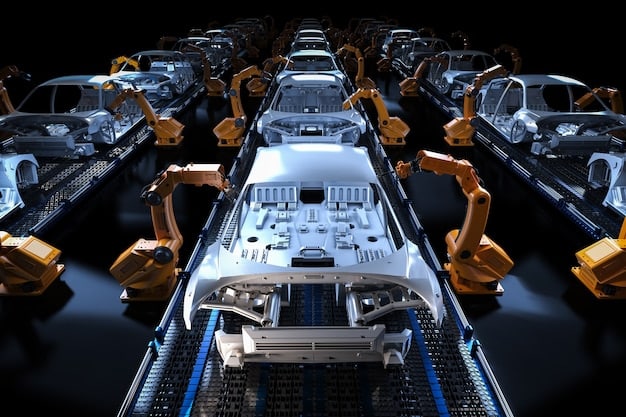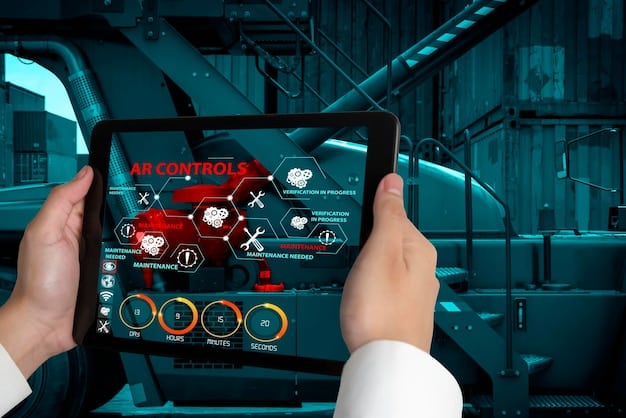AI Revolution: Transforming Car Manufacturing Processes

Artificial intelligence (AI) is revolutionizing car manufacturing processes by enhancing automation, improving quality control, optimizing supply chains, and personalizing customer experiences.
The automotive industry is undergoing a massive transformation, and at the heart of it lies artificial intelligence. Discover how artificial intelligence (AI) is revolutionizing car manufacturing processes, driving efficiency, and creating smarter, safer vehicles.
The Dawn of AI in Automotive Manufacturing
Artificial intelligence is no longer a futuristic concept; it’s a present-day reality in automotive manufacturing. It’s changing traditional methods and creating new possibilities.
AI is becoming an integral part of the automotive industry, especially in manufacturing, where it is enhancing efficiency, precision, and innovation. The integration of AI is changing the way cars are made, from design and production to quality control and supply chain management.

Enhanced Automation with AI
AI-powered robots perform repetitive tasks with higher accuracy and speed.
- Robotic Precision: AI algorithms enable robots to perform complex tasks like welding, painting, and assembly with minimal error.
- Adaptive Automation: AI systems can adjust their processes based on real-time data, optimizing workflows and reducing downtime.
- Predictive Maintenance: AI algorithms analyze data from machinery to predict maintenance needs, reducing unexpected breakdowns.
These advancements not only speed up production but also ensure consistency and quality across the board.
Improving Quality Control Through AI
Quality control is crucial in car manufacturing, and AI is enhancing this area by leaps and bounds. AI is helping to detect defects early preventing issues that could affect safety.
AI-driven inspections detect flaws that human eyes might miss, reducing defects and recalls.
- Automated Visual Inspection: AI analyzes high-resolution images of car parts to identify scratches, dents, or other imperfections.
- Predictive Quality Analytics: AI systems analyze data from various stages of production to predict potential quality issues.
- Real-Time Defect Detection: Machine learning algorithms identify anomalies during the manufacturing process, allowing for immediate corrective action.
This leads to higher-quality vehicles and increased customer satisfaction.
AI in Supply Chain Optimization
The automotive supply chain is complex, but AI is optimizing it by predicting demand and streamlining logistics.
AI algorithms improve supply chain accuracy by predicting demand and addressing disruptions.

Predictive Demand Forecasting
AI algorithms analyze market trends, seasonal variations, and other data points to predict future demand for specific car models and components.
- Inventory Management: AI optimizes inventory levels by ensuring the right amount of materials are available when needed, minimizing storage costs.
- Logistics Optimization: AI analyzes transportation routes and delivery schedules to reduce shipping times and costs.
- Risk Management: AI identifies potential disruptions in the supply chain, such as weather events or geopolitical instability, allowing manufacturers to proactively mitigate risks.
AI enhances efficiency and reduces costs by optimizing inventory and logistics.
Personalization of Customer Experiences
AI allows manufacturers to offer customized features, improving customer satisfaction.
AI enables carmakers to offer customized features, enhancing customer satisfaction and loyalty.
Customized Car Configurations
AI-powered configurators allow customers to personalize their vehicles with various options, such as paint colors, interior finishes, and tech features.
AI facilitates personalization by allowing customers to tailor their vehicles to specific needs.
- Virtual Reality Showrooms: AI creates virtual showrooms where customers can explore different car models and configurations in a realistic 3D environment.
- AI-Powered Assistance: AI chatbots provide personalized recommendations and answer customer questions about available options and features.
- Data-Driven Customization: AI algorithms analyze customer preferences and behavior to suggest customizations that align with their individual tastes.
Personalized vehicles foster stronger bonds between manufacturers and consumers.
AI-Driven Design and Engineering
AI tools are being used to design car models to allow engineers to create more efficient and innovative designs.
AI is revolutionizing vehicle design, enabling engineers to create more efficient designs.
Generative Design
AI algorithms generate multiple design options based on specific criteria, such as weight, strength, and aerodynamics. This method accelerates the design process and results in more innovative solutions.
- Simulation and Testing: AI enables virtual simulations to test designs under various conditions, identifying potential weaknesses and optimizing performance.
- Material Selection: AI algorithms analyze material properties to recommend the most suitable materials for specific components, balancing cost, weight, and durability.
- Aerodynamic Optimization: AI helps refine vehicle aerodynamics, reducing drag and improving fuel efficiency.
AI-driven designs push the boundaries of automotive innovation.
Challenges and Future Trends
Despite its benefits, AI integration in car manufacturing faces challenges. Overcoming these challenges offers great promise for the future.
While AI offers significant benefits, its implementation faces challenges, with great potential.
Data Security and Privacy
AI systems rely on vast amounts of data, raising concerns about data security and privacy. Automakers must invest in robust cybersecurity measures to protect sensitive information from breaches and unauthorized access.
- Ethical Considerations: The use of AI in car manufacturing raises ethical questions about job displacement and algorithmic bias.
- Skills Gap: Implementing AI requires a skilled workforce capable of developing, deploying, and maintaining these systems.
- Integration Costs: The initial investment in AI technology, including hardware, software, and training, can be substantial.
Addressing these challenges will unlock even greater potential for AI in car manufacturing.
| Key Point | Brief Description |
|---|---|
| 🤖 Automation | AI-powered robots enhance precision and speed in manufacturing. |
| 🔍 Quality Control | AI-driven inspections detect flaws, reducing defects and recalls. |
| 🚚 Supply Chain Optimization | AI optimizes inventory, logistics, and risk management. |
| 🚗 Personalization | AI enables customized car configurations and virtual experiences. |
FAQ
▼
AI-powered robots perform tasks with greater accuracy and speed, optimizing workflows and reducing downtime, which enhances the overall efficiency in car manufacturing.
▼
AI improves quality control by detecting flaws and predicting potential issues, leading to fewer defects and recalls in the manufacturing process of cars and their components.
▼
AI optimizes the supply chain by accurately forecasting demand, managing inventory, and streamlining logistics, leading to cost savings and improved efficiency for car manufacturers.
▼
AI offers personalized vehicle configurations and virtual reality showrooms, allowing customers to explore and customize their desired car models, thereby enhancing satisfaction.
▼
Challenges include data security, ethical considerations, and a skills gap, requiring manufacturers to invest in cybersecurity, ethical practices, and workforce training in the area of AI.
Conclusion
From design and engineering to supply chain management and customer experiences, AI is revolutionizing car manufacturing. Despite the barriers of data privacy and integration costs, the transformative power of AI is undeniable, promising a future where vehicles are built more efficiently, safely, and sustainably.





